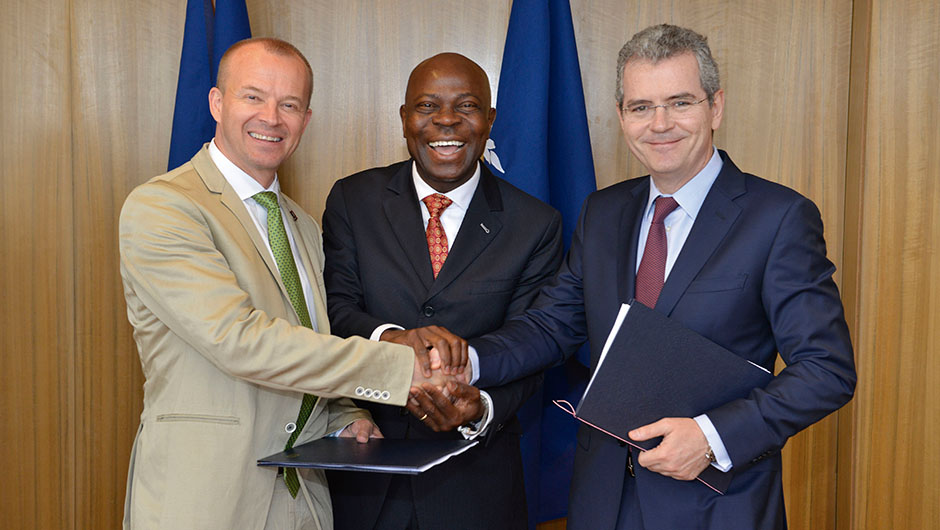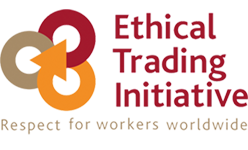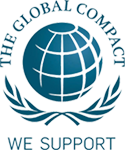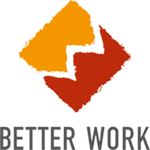4. Stakeholders engagement

The challenges posed by a global supply chain are shared by many stakeholders. The positive impact of working together to identify these challenges and seek shared solutions is beneficial to the industry in general and to the development of communities where the Group is present. There are many international and local platforms and forums that create synergies and achieve real progress in the protection of the human rights of workers. One of the most important of these is the international trade union IndustriALL, with whom Inditex has recently renewed the Global Framework Agreement (GFA) signed in 2007. This is complemented by Inditex’s active participation in reputed international platforms such as the Ethical Trading Initiative (ETI), the International Labour Organization (ILO), Better Work and the United Nations Global Compact.
Renewal of the Framework Agreement with IndustriALL

In 2007, Inditex signed a Framework Agreement with the International Textile, Garment and Leather Workers’ Federation (ITGLWF), an institution which, following its merger with other federations, is now known as IndustriALL Global Union. To date, this is the only agreement of its kind signed by a global retailer.
This agreement protects the interests of all workers involved directly or indirectly in the set of activities developed by Inditex, establishing better standards in matters of trade union rights, health, safety and environmental practices.
Following more than six years of fruitful collaboration, Inditex and IndustriALL have renewed their Framework Agreement, positioning freedom of association and the right to collective bargaining as the central pillars of a sustainable supply chain, since these rights provide workers with the necessary mechanisms to control and strengthen their labour rights.
During the signing of the agreement, the Secretary-General of IndustriALL, Jyrki Raina, stated: “The GFA with Inditex is a model of mature industrial relations with a multinational corporation. In promoting trade union values, the GFA empowers workers and improves lives, allowing even the most vulnerable people at the bottom of Inditex’s supply chain to be heard and protected. Essentially, with the GFA, Inditex underlines that unions are good for business and necessary partners in creating a fair and sustainable supply chain. We look forward to continuing our successful relationship with Inditex well into the future.”

| SEVEN YEARS OF FRAMEWORK AGREEMENT | |
|---|---|
| 2007 | Signing of the Framework Agreement |
| Ensure compliance with all international labour standards in the operations of Inditex’s suppliers across the globe. | |
| 2012 | Establishment of the Protocol contained in the Framework Agreement |
| The Protocol transferred implementation of the Agreement to local operations, which has led to close cooperation with local trade unions in the various clusters. | |
| 2014 | Renewal of the Framework Agreement |
| Freedom of association and the right to collective bargaining as the central pillars of a sustainable supply chain. | |
Evolution of the Accord on Fire and Building Safety in the Textile Industry in Bangladesh
The collapse of the Rana Plaza building in 2013, considered to be the biggest accident in history of the textile industry in which more than 1,000 people lost their lives, led to the creation of cooperation platforms by the world’s main textile brands with the objective of improving the health and safety conditions in factories in Bangladesh. Although Inditex had no commercial relationship with any of the factories in Rana Plaza, the company took part from the outset in the initiatives which emerged from the tragedy to palliate the consequences of the collapse.
In May 2013, the Accord on Fire and Building Safety in Bangladesh (known as the Accord) was established, a pioneering agreement between international brands and distributors, local and international unions and NGOs in order to ensure better and lasting improvements to working conditions in the country’s textile industry. Inditex is a founding member of the Accord, which by the end of 2014 encompassed more than 190 textile brands, retailers and importers, as well as two international trade unions, eight local trade unions and four NGOs. During the past year, the Accord has brought together all the stakeholders in the country to embark on and consolidate a process based on the inspection of 1,103 factories in Bangladesh to date, the correction of the breaches detected and the creation of health and safety committees that will serve as a platform for dialogue and interaction between workers and factory owners with a view to achieving a more sustainable management of health and safety issues in Bangladesh.
As a signatory of the Accord, Inditex has undertaken the commitment to improve conditions in the factories where the Group carries out its production activity with the aim of ensuring that workers can perform their tasks in a safe environment.
As a result of this commitment, Inditex has undertaken to submit the details of its supply chain in Bangladesh to the Accord on a regular basis, and take responsibility for ensuring that these factories implement any Corrective Action Plans to resolve breaches detected during the inspections performed at each factory (building structure, fire prevention, and electrical installations).
At the same time, Inditex has enhanced and strengthened control mechanisms within its supply chain, placing an emphasis on communication with external and internal stakeholders. In this respect, apart from its involvement in the Buyers’ Forum Bangladesh organized by the IFC and the platform Better Work Bangladesh, there has been an increase in activities offering added value, such as training for suppliers in supply chain management or consulting services on health and safety issues with a focus on the structural aspect of buildings. Efforts have also been made to encourage responsible purchasing practices within the Inditex Group’s various commercial teams with ongoing training for our purchasers. Inditex has redoubled its efforts with its own assessment and improvement measures within the country, with more than 370 social audits, 132 compliance visits and 113 specific health and safety/building structure visits. These measures have been gradually extended to the brand’s other supply clusters, and in 2014, some 692 specific health and safety visits were performed.
Inditex’s CSR team in Bangladesh has taken a leading role in these initiatives with a multilateral approach, bringing together the range of strengths and improvement areas for each stakeholder in order to achieve objectives in a crosscutting manner, resulting in a mutually beneficial learning process and common strategy.
Programmes with landmark organizations

Ethical Trading Initiative
- Commitment to its Base Code
- Active participation in the working group created to draft general principles allowing for wages in the supply chain to be increased
- Participation in the Tamil Nadu Multi Stakeholder Initiative promoting joint efforts to abolish abusive forms of employment in the south of India based on programmes focusing on communities, the implementation of direct measures in the spinning industry, and support for policy changes ensuring increased protection for women
- Active participation in meetings of the China Caucus to deal with the challenges faced by the industry and share good practices, seeking joint solutions
- Participation in forums and seminars on a variety of issues: living wages, migrant populations, etc.

United Nations Global Compact
- Since Inditex signed up to the Global Compact in 2001, it has undertaken to respect its 10 principles
- Active role in initiatives such as the Advisory Group on Supply Chain Sustainability and the Human Rights Working Group of the Global Compact Network Spain

Better Work
- Better Factories Cambodia: More than 30 factories registered to the programme in 2014
- Better Work Vietnam: Four factories registered to the programme
- Inditex will continue to strengthen its collaboration with the Better Work programme with the incorporation of factories in two new countries – Bangladesh and Indonesia – in 2015 and an increase in the number of factories registered in Vietnam for the same year.
- Participation in the Better Work Global Buyers’ Forum, in which international brands collaborate to achieve progress on sustainability issues

International Labour Organization
- Participation in the SCORE project initiated by the International Labour Organization in China to improve sustainability in factories
- Participation in preparatory meetings for the Buyers’ Forum Pakistan to facilitate and promote a platform for dialogue between enterprises in the textile sector, suppliers and the government
